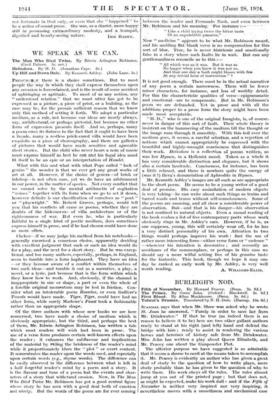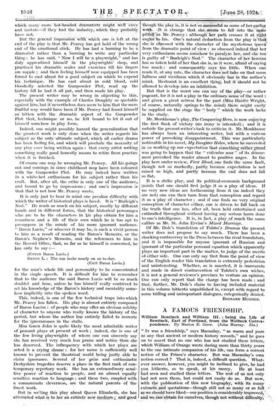BURLEIGH'S NOD.
Tolstoi's Dramas. Translated by N. I. Dole. (Harrap. 10s. ed.) SCANDAL says that when Mr. Shaw .was asked- why, he wrote St. Joan- he- answered, " Purely in order to save her from Mr. Drinkwater." If that be true (as, indeed there is no
reason to believe it to be) here are two other gallant authors ready to stand at his right (and, left) hand and defend the bridge with him ; ready to assist in rendering the various heroes and heroines, of history safe from Mr. Drinkwater. Miss John has written a play about Queen Elizabeth, and, Mr. Peacey one about the Gunpowder Plot.
The ulterior purpose we- have suggested is so admirable that it seems-a shame to cavil at the means taken to accomplish it. Mr. Peacey is evidently an author who has. given_ a great
deal of study to the. question of how to write. plays, more study- probably. than he- has- given to- the_question_of_why. to write them. His work obeys all the rules. The rules almost jump at you out of the printed page ; but that doe's not, as might be expected, make his work dull--:- and- if- the-Y-1th of November is neither. very inspired nor- very inspiring, it nevertheless moves with a smoothness and mechanical ease whieli-many more---Ttat-Itearfert dranrat- ista— might Well—FriVy
and imitate—if they had the industry, which they probably have not
Brit-the general' linpregaidii—With— which one is left at the end' of the play is that Mr. Peacey has got hold of the wrong end' of the einotional stick.- He has had a bnriiing to be a drainatist rather than a burning to write any particular thing : he has said, "Now I will be a playWright," and has duly apprenticed himself in-. the playwrights' shop, and practised his dramatic, wales and exercises. till his fingers: are supple ; and then feeling himself now equipped has been forced to cast -about for a good subject on which to expend his technique. He has cast about in cold blood, cold bloodedly selected the Gunpowder Plot, read up the history till he had it all pat, 'and then made his play.
The present writer may be wrong in objecting to this, especially with the example of Charles Doughty so quotable against him, but it nevertheless does seem to him that the more fruitful way would have been if Mr. Peacey had found himself SO- bitten with the .dramatic aspect of the Gunpowder Plot that, technique or no, he felt bound to let it out of himself somehow in play form.
Indeed, one might possibly hazard the generalization that the greatest work is only done when the writer regards his subject as the only ultimate subject, which all earlier drama has been feeling for, and which Will preclude the necessity of any play ever being written again : that every artist writing something really good honestly means to retire from practice when it is finished.
Of course one may be wronging Mr. Peacey. All his goings out and comings in since childhood may have been coloured with- the Gunpowder Plot. He may indeed have written in a white-hot enthusiasm for his subject rather than his craft. But, after all, the critic is only one of the audience, and bound to go by impressions; and one's impression is that that is not how Mr. Peacey wrote.
It is only just to bear in mind one peculiar difficulty with which the writer of historical plays is faced. It is " Burleigh's Nod." He reads so much on his subject, mostly by different hands and in different forms, that the historical personages who are to be the characters in bis play obtain for him a roundness and a life of their own which he is too apt to presuppose in the minds of his more ignorant audience. "Baron Lucio," or whoever it may be, is such a vivid person to him as a result of reading the Baron's Memoirs, or the Baren's Nephew's Memoirs, and the references to him in the Record Office, that, so far as he himself is concerned, he has only to say :—
- (Ei..rrEit Baron Lueio.) -• • BARON L.: The sun looks sourly on us to-day.
(Exrr Baron Lueio.) for the man's whole life, and personality to be concentrated in the single speech. It is difficult for him to remember that to the audience the said Baron Lucio will be so much doublet and hose, unless he has himself really contrived to set his knowledge of the Baron's history and mentality some- how implicitly into the spoken word.
This, indeed, is one of the few technical traps into which Mr. Peacey has fallen. His play is almost entirely composed of Baron Lucios : of people who may offer an obvious solidity of character to anyone who really -knows the history of the period, but whom the author has entirely failed to recreate for the ignoramuses in the stalls.
Miss Gvkii j-ohn is quite likely the most admirable -writer of peasant plays at present at work ; indeed, she is one of the few living playwrights of whom one can sincerely say she has received very much less praise and notice than she has deserved. The infrequency with which her plays are acted is a crying shame : , for her name is sufficiently well known to prevent the theatrical world being justly able to claim ignorance. Several of her grim and enthusiastic- Derbyshire tragedies deserve a place in the first rank of con- temporary repertory work. She has an extraordinary sensi- tive . power of reaction to people, and an almost equally- sensitive reaction to language ; and these two, coupled with a consummate cleverness, are the natural parents of the finest 'work.
But in writing this play about Queen Elizabeth, she has attempted what is to her an entirely new medium Land good
• though' thePlay -is, it is not so successful as some of her.garliq Iva*. 'llt is strange that she seems to fall- into the same pitfallfits Mr. Penney: although her path crosses it at right anglii-ixt his. One's natural deduction from the play isI114 sheds ol*essed with the character of the mysterious queen' from the dramatic point of view : so obsessed indeed that her very enthusiasm seems somehow to paralyze her and she too. is guilty of " Btirleigh's Nod." The character of her heroine has so taken hold of her that she is, as it were, afraid of saying too much : and consequently says too little. When one reads it, at any rate, the character does not-take on that same ifullness and vividness which it obviously has in the author's mind. Restraint is an excellent thing, but it should not be allowed to develop into an inhibition.
But that is the worst one can '§ay of the play—or rather 'pageant, for it is not nplay in-the.cirdiniwys-ense'of the Word : and given a great actress for the part (Miss ilaidee Wright, of course, naturally springs-to the mind) there might easily be supplied on the stage the ." body " which the work lacks
in the study. • .. . , . , .
Mr. Monkhouse's play, The Con4uering Hero, is now enjoying the first flush of victory (no . irony T.is'intended) ; and it is outside the present writer'stask to criticize it Mr. Monkhbuse has always been an interesting writer, but with a curious power of provoking disappointment. _ This was particularly noticeable in his novel, My Daughter Helen, where he in so working up our expectation that sbinething rather grand was going to happen that the ridieulysmus of its &Wane- ment provoked the reader. almost to Pcisitive anger.: the ;play here under review, First Blood, one finds' the same. fault, .though not so markedly, partly because . expectation is not raised so high, and partly because the end does not fall
so flat. .
It is a strike play, and its political-economic background insists that one should first judge it as a play of ideas. If no very new ideas are forthcoming from it (as indeed they are not) one can then turn from that conception and regard it as a play of character ; and if one finds no very original conception of character either, one is driven to fall back on the truth that one has, after all, been held entertained and enthralled throughout without having any serious harm done to one's intelligence. It is, in, fact, a play_otnanch the same calibre as Mr. St. John Ervine's Mixed Marriage.
Of Mr. Dole's translation of Tolstoi's Dramas the present writer does not propose to say much. There has been a shocking controversy in the Press betWeen the rival translators, and it is impossible for anyone ignorant of Russian and ignorant of the particular personal equation which apparently plays an important part in the matter, to judge of the merits ot either side. One can only say that from the point of view. of the English reader this translation is extremely pedestrian and uninteresting. Whether, as is asserted, it is inaccurate and made in direct 'contravention of TolatoPs. own willies, it is not a general reviewer's province to venture an opinion. One can only report that the charge has' been made ; and that, further, Mr. Dole's claim to haying included material in this volume hitherto unpublished is, except with regard to some trifling and imimPortant dialogues, categorically denied.
RICHARD HUGHES.















































 Previous page
Previous page